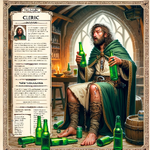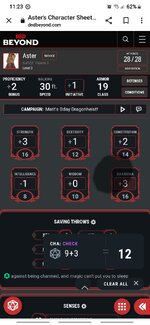
@Lee The one thing I think I've noticed is that the alert window went back to being whack. I don't know if this was related to my turning off push notifications for Firefox as those two happened simultaneously, but previously it had the little dot for the Read/Unread and didn't try to blind me on new unread ones...
@Ben not just you I noted it in the error thread goingView attachment 5413
@Lee The one thing I think I've noticed is that the alert window went back to being whack. I don't know if this was related to my turning off push notifications for Firefox as those two happened simultaneously, but previously it had the little dot for the Read/Unread and didn't try to blind me on new unread ones...
Things look good to me at the moment@Ben not just you I noted it in the error thread going
Our code ninja fixed itThings look good to me at the moment
That sounds better than a code monkeyOur code ninja fixed it
That sounds better than a code monkey

If you've got a semi-decent PC you could look into Stable Diffusion on github. It can take a bit of Python fuckery to get working, but it's by far the most unrestricted one I've used.Ben over here making me wish DALL-E was free
I'm just lazy and this works from my phone.
TD
ES COO Shitposting Dept. of GWF
I just read something where it might be your ability score minus 10 divided by 2 (and then presumably rounded up).Noob question alert:
"Gorgug rolls a d20. He rolls an 11. Gorgug has a STR rating of 14, therefore he has a Strength modifier of +2. His STR Check result is 13, and that's what he tells the DM he rolled."
Where did the +2 come from? The 13? I'm very confused by the numbers here.
Let me know if I found the right information. It was the first reddit post I found in a super quick search.
The modifiers come from you score minus 10 divided by 2 rounded down. The DnD beyond is nice enoigh to do the math for you.
I always give the math. I'll say I rolled a 14 with a plus 2 modifier so 16 total. The reason I do this is to show any natural 20s or 1s. Say you roll a 20 you still add the plus 2 but a lot of DMs do special things for a natural 20s and 1s. You can still get a 20 by rolling an 18 plus a 2, but its not a natural 20. So not as special.
I always give the math. I'll say I rolled a 14 with a plus 2 modifier so 16 total. The reason I do this is to show any natural 20s or 1s. Say you roll a 20 you still add the plus 2 but a lot of DMs do special things for a natural 20s and 1s. You can still get a 20 by rolling an 18 plus a 2, but its not a natural 20. So not as special.
TD
ES COO Shitposting Dept. of GWF
VashTheStampede
Self-Care
Yeah, modifiers is something I'm still planning on plugging into the thread. But Alu and Christina are accurate with their takes.Noob question alert:
"Gorgug rolls a d20. He rolls an 11. Gorgug has a STR rating of 14, therefore he has a Strength modifier of +2. His STR Check result is 13, and that's what he tells the DM he rolled."
Where did the +2 come from? The 13? I'm very confused by the numbers here.
VashTheStampede
Self-Care
Bards mainly want Charisma. Then Constitution and/or Dexterity.That helps - thank you!
My WIS is only 6.
Is that terrible for a Tortle Bard or do I not need WIS?
As long as your main stat is decent, everything else is just flavor for how to act out your character really.
TD
ES COO Shitposting Dept. of GWF
Okay cool - I think my stats are good then. Thanks!
 www.dndbeyond.com
www.dndbeyond.com
D&D Beyond Character Sheet
The World's most intelligent Dungeons and Dragons Character Sheet.
TD
ES COO Shitposting Dept. of GWF
Oh and just for anybody in general Constitution should never be your dumper stat. I mean you can if you want to, but constitution is what determs how much HP points you get. When you level up, you are going to roll your hit dice and add your constitution modifier to determ how many more hit points you get. Some DMs will let you reroll a 1 because that sucks super lots. So having a negative constitution modifier would be super bad.
TD
ES COO Shitposting Dept. of GWF
Christina already nailed the explanation, but just in case it helps:
In Dungeons & Dragons (D&D), stat modifiers are derived from ability scores, which are fundamental to a character's capabilities. These scores typically range from 3 to 18 and are assigned to six main abilities: Strength, Dexterity, Constitution, Intelligence, Wisdom, and Charisma. The stat modifier is a number that represents how much an ability score affects game play.
### Calculation of Stat Modifiers:
1. **Formula**: The standard formula to calculate a stat modifier is to subtract 10 from the ability score, and then divide the result by 2, rounding down.
2. **Examples**: - If a character has a Strength score of 15, the modifier would be ((15-10)/2) = 2.5, which rounds down to +2. - For a score of 8, the modifier is ((8-10)/2) = -1.
### Usage of Stat Modifiers: -
**Skill Checks**: When a character attempts an action like climbing a wall or recalling a piece of lore, they make a skill check using the appropriate ability modifier. For example, a Dexterity check might be required for stealth. -
**Attack Rolls and Damage**: In combat, modifiers affect attack rolls (chance to hit) and sometimes damage rolls. For instance, a character's Strength modifier would be added to an attack roll with a melee weapon. -
**Saving Throws**: These are rolls made to resist or reduce the effects of spells, traps, poisons, etc. Each saving throw uses an ability modifier relevant to the effect being resisted. -
**Other Calculations**: Modifiers can also influence various other aspects of the game, like initiative rolls (Dexterity modifier) or the number of spells a character can prepare (Intelligence or Wisdom modifier for wizards and clerics, respectively).
In summary, stat modifiers are crucial in translating a character's raw potential (ability scores) into practical effects in the game, influencing everything from social interactions to combat outcomes.
TD
ES COO Shitposting Dept. of GWF
If you are meaning these type of proficiencies. These you pick whatever you feel will match with your character. What these are used for is say you want to try and pet a cat. The DM could ask you for an animal handling check to see if the cat lets you pet it or it straches your face. You could want to jump off a building. You'll get asked for athletics or acrobatics. You could get asked for a history check to see if your character knows some piece of information. Perception check to see what you notice in a room. So choose what you think fits best. No wrong answers.


TD
ES COO Shitposting Dept. of GWF
This is always where you could make an argument for your type of check. In how you phrase your usage. Intimidation vs. Persuasion for example. If you grab the hilt of your sword while trying to talk a guard into letting you in a room, that would be intimidating but if you have your hand on your money pouch, that's persuasion.
TD
ES COO Shitposting Dept. of GWF
In game cliques.What are the advantages/disadvantages associated with knowing or not knowing a language?
Let's speak the same language.
I'm guessing but also #TeamTubby
Lol if you want to learn to speak Giant as well as Common be my guestIn game cliques.
Let's speak the same language.
I'm guessing but also #TeamTubby
TD
ES COO Shitposting Dept. of GWF
Tortle Dude is a suspiciously quick learner of brand new languages.Lol if you want to learn to speak Giant as well as Common be my guest
Tortle Dude is a suspiciously quick learner of brand new languages.

Live look at me trying to go for a night on the town with Tortle Dude
TD
ES COO Shitposting Dept. of GWF

Live look at me trying to go for a night on the town with Tortle Dude

Re-enactment of learning the Giant language moments before hitting the town with his new friend.
Knowing languages is just like knowing languages in real life. Say you run into infernals talking, the DM will ask if anybody knows infernal if yes that person will be told what they are saying. If nobody knows, then you don't get to know what they said. The languages also work for written word too.
Can help with persuasion if you start speaking to a gnome in gnomish. Helps keep you from killing yourself if you're in a dwarven tomb and see a sign in dwarvish saying "this lever will blow you up, do not pull".What are the advantages/disadvantages associated with knowing or not knowing a language?
TD
ES COO Shitposting Dept. of GWF
This is why you send the ranger/rogue ahead of the group. They'll likely have higher perception and spot things sooner. Or so they die first to the poison dart trap.Oh no there's traps?
Travel with Tortle Dude at your own risk.
Is there room for two in your shell?Oh no there's traps?
Travel with Tortle Dude at your own risk.
Only if you remove your legs.Is there room for two in your shell?
Tuberius of Wadawurrung at your serviceThis is why you send the ranger/rogue ahead of the group. They'll likely have higher perception and spot things sooner. Or so they die first to the poison dart trap.
Depends if you moonlight as cupid.Is there room for two in your shell?





